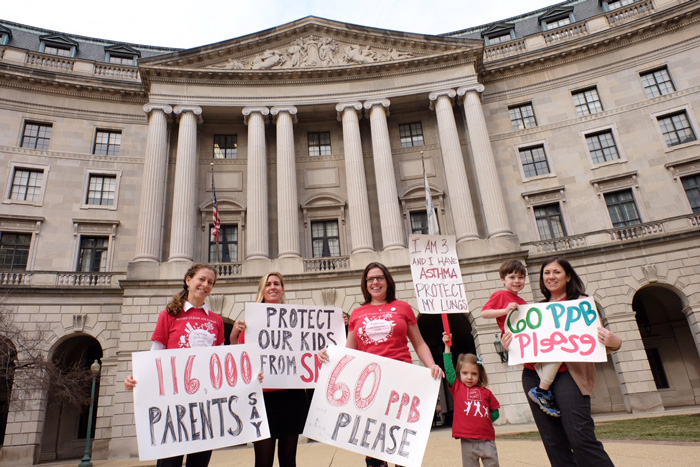The comment period has now closed for the Environmental Protection Agency’s (EPA) proposal to strengthen our national health-based smog standards, and we know one thing already:
Support for cleaning up our air has been tremendous and far-reaching.
More than half a million people from across our nation sent comments urging EPA to strengthen America’s health-based smog protections. And we’re so grateful to our dedicated members and activists for helping EDF collect more than 130,000 of those comments.
EDF strongly supports strengthening our public health standards for ground-level ozone—more commonly known as smog.
Smog contributes to a variety of health problems, including increased risk for asthma attacks, long-term lung damage, other heart and lung diseases, and even premature death. The most susceptible groups are young children and elderly adults.
But it isn’t just EDF – and it isn’t only environmental organizations — calling for cleaner air.
Leading medical associations, states, moms, and environmental justice organizations have highlighted the challenges their constituencies face from this pollution — and have voiced their support for tighter smog protections.
Here are just a few examples:
WE ACT for Environmental Justice said improved smog standards are urgently needed to protect the children in Harlem afflicted by smog pollution:
According to the New York Department of Health and Mental Hygiene, in 2012, children aged 0 to 4 in the Harlem [sic] visited the emergency room 280 times because of asthma. There is no doubt that children in Northern Manhattan are suffering disproportionately from asthma, which is exacerbated by the formation of Ozone and other social stressors.
Mom’s Clean Air Force also weighed in:
Parents have a right to know the truth about whether the air is safe to breathe… Smog standards that reflect current science will protect children from harmful air pollution.
The American Academy of Pediatrics said smog standards must be improved for the sake of children:
Simply put, children are different. They breathe faster. They spend more time outdoors, playing and being physically active. These combined differences mean that, at a given concentration of air pollution, children will be exposed to a higher dose. But their lungs are not fully developed until about 18 years of age. Children are thus at greatest risk from air pollution, because their increased physical activity, plus greater time spent outdoors, means that they are exposed to a higher dose of air pollutants.
In a 2014 joint letter to the White House Office of Management and Budget, Attorneys General from New York, Maryland, New Hampshire, New Mexico and Rhode Island all expressed support for strengthening our nation’s smog standards, stating that smog pollution has been a persistent problem for their states:
The States [listed above] have been battling ozone pollution (smog) for decades… Although we have made strides to reduce smog levels that harm public health in areas such as New York City and that harm our natural resources in areas such as the Adirondacks, smog remains a persistent threat. Much of this pollution is generated in upwind states and carried by prevailing winds into our States.
Dozens of organizations, including EDF, submitted a letter urging EPA to issue strong standards:
EPA must protect the health of children, people with asthma and other lung diseases, older Americans and other sensitive and vulnerable populations.
The American Lung Association and the March of Dimes wrote an op-ed for CNN that discussed the serious health issues at stake and voiced support for strengthened smog standards:
Over the past several years, a number of studies have indicated a likely link between higher levels of maternal ozone exposure and poor health outcomes in infants, including changes in lung structure and function, low birth weight and neuro-behavioral abnormalities. Many of these health effects can be expected to have lifelong consequences… Strengthening the ozone standard to reflect the best current science will help save lives and protect our families, including pregnant women and their babies.
This broad support for stronger smog standards shows how much is at stake for all of us.
Our nation has proven time and again that, by working together, we can achieve pollution reductions in a cost-effective manner. Strengthening these life-saving standards now will help us continue, and build on, progress made in the past that has provided healthier and longer lives for millions of Americans.










